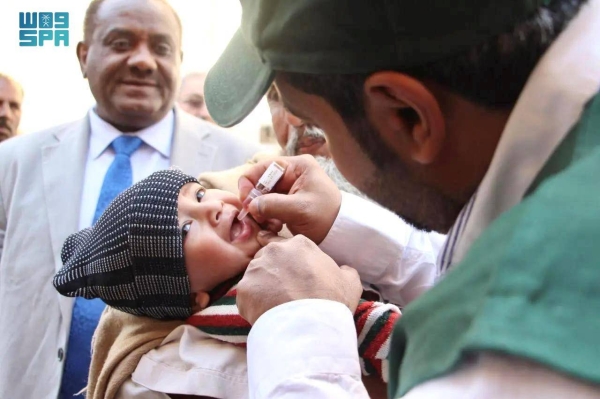Saudi Arabia has been actively involved in combating polio in less developed countries by implementing 15 projects totaling $39.114 million. Ten of these projects were carried out in countries such as Palestine, Afghanistan, Sudan, Somalia, Iraq, Pakistan, the Central African Republic, the Democratic Republic of the Congo, and Guinea, with an investment of $11.314 million through the King Salman Humanitarian Aid and Relief Center (KSrelief). The Kingdom has prioritized enhancing the healthcare sector in these regions, recognizing its vital role in improving public health, developing healthcare organizations, and providing life-saving medical services to millions of people globally.
The commitment of Saudi Arabia extends beyond just combating polio, as the Kingdom has provided over $600 million to protect 370 million children annually from polio and help uplift millions out of poverty across 33 member countries of the Islamic Development Bank, in collaboration with the Bill & Melinda Gates Foundation. A significant portion of this funding, $500 million over five years, has been allocated to the Global Polio Eradication Initiative to support the provision of polio vaccines in the most affected areas. Saudi Arabia has also made substantial contributions in the fight against measles and polio, contributing $57.67 million through partnerships with organizations like UNICEF, the World Health Organization (WHO), and the Global Alliance for Vaccines and Immunization (GAVI).
In addition to financial contributions, Saudi Arabia has implemented polio and measles eradication projects in several countries, with a total investment of $15 million, including $11.14 million spent on projects executed by KSrelief. Notably, in 2016, KSrelief responded to the healthcare needs of the Palestinian people by delivering 15,000 doses of meningitis vaccines and 15,000 doses of polio vaccines to the Palestinian Ministry of Health. The Kingdom also actively participates in the observance of World Polio Day on October 24 each year through its humanitarian arm, KSrelief, contributing to global efforts aimed at eradicating polio, reducing its severe impact on individuals and communities, and raising awareness about the serious health risks associated with the disease.
Overall, Saudi Arabia’s commitment to combating polio and other preventable diseases in less developed countries is a testament to its dedication to global health and humanitarian efforts. The Kingdom’s significant financial contributions, partnerships with international organizations, and implementation of various projects have had a tangible impact on improving public health, providing essential medical services, and ultimately saving lives in some of the world’s most vulnerable regions. By prioritizing healthcare initiatives and investing in sustainable healthcare solutions, Saudi Arabia continues to play a crucial role in advancing global health security and promoting the well-being of populations in need.
In conclusion, Saudi Arabia’s investments in combating polio and other diseases in less developed countries reflect its commitment to global health equity and humanitarian assistance. The Kingdom’s partnerships with organizations like the Bill & Melinda Gates Foundation, UNICEF, WHO, and GAVI have allowed for the implementation of crucial healthcare initiatives, such as polio and measles eradication projects, benefiting millions of people in vulnerable communities. Through its efforts, Saudi Arabia not only contributes to the global fight against preventable diseases but also demonstrates its unwavering support for public health and well-being worldwide.










